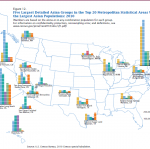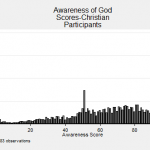In the past few years, I’ve started to notice just how often I choose to be in situations that have a lot of other people like me (age, gender, social class, etc….) I don’t think that I consciously choose to do so, rather how I express my interests in the context of the constraints and opportunities of my life end up being similar to how other people with similar interests, opportunities, and constraints do.
An easy example, I usually go grocery shopping early Saturday morning, and, lo and behold, there’s a bunch of other middle-aged guys there that time too. Same with going to the gym in the late afternoon and lots of other things that I do.
I notice this self-selection into situations the most when I end up in non-typical (for me) situations. So, if I change my shopping time, I’m surprised by how many elderly people are there in mid-morning, mothers with kids in the early afternoon, and professionals stopping on the way home from work in the early evening.
Similar principles hold in my experience with Christianity. My family and I attend a church which has a lot of people in the same general demographic categories as us. In fact, during services, we often sit among those who are most like us (think middle-aged).
This general principle–of similar people selecting themselves into religious groups–is one of the general explanations for religious homogeneity, i.e., why people in a given religious denomination or congregation or small group tend to be similar to each other.
Probably the most frequently studied form of religious homogeneity regards race. Bill Graham famously said that Sunday morning at 11:00 am is the most segregated hour of the week. This is because people feel most comfortable with similar others, and an important aspect of similarity in our culture is race an ethnicity.
So far this is rather straightforward, but here is where it gets tricky: Is this homogeneity a good thing?
On one hand, it provides a powerful mechanism for growth. Churches (or small groups or denominations) can probably grow best by targeting “types” of people. So, for instance, popular college ministries now offer different groups for students of different racial and ethnic backgrounds. Likewise, I know of a mega-church that offers different services targeting different groups.
On the other hand, this homogeneity decreases our interactions with people who are different than us, and so we might miss out on some of the benefits of such across-group interactions.
I don’t know if there is a “right” answer to this, and what’s best might vary by situation, but it’s an interesting, powerful dynamic to be aware of. If nothing else, it explains to me why I keep on sitting next to fellow old guys who like to joke around (and you know who you are).












